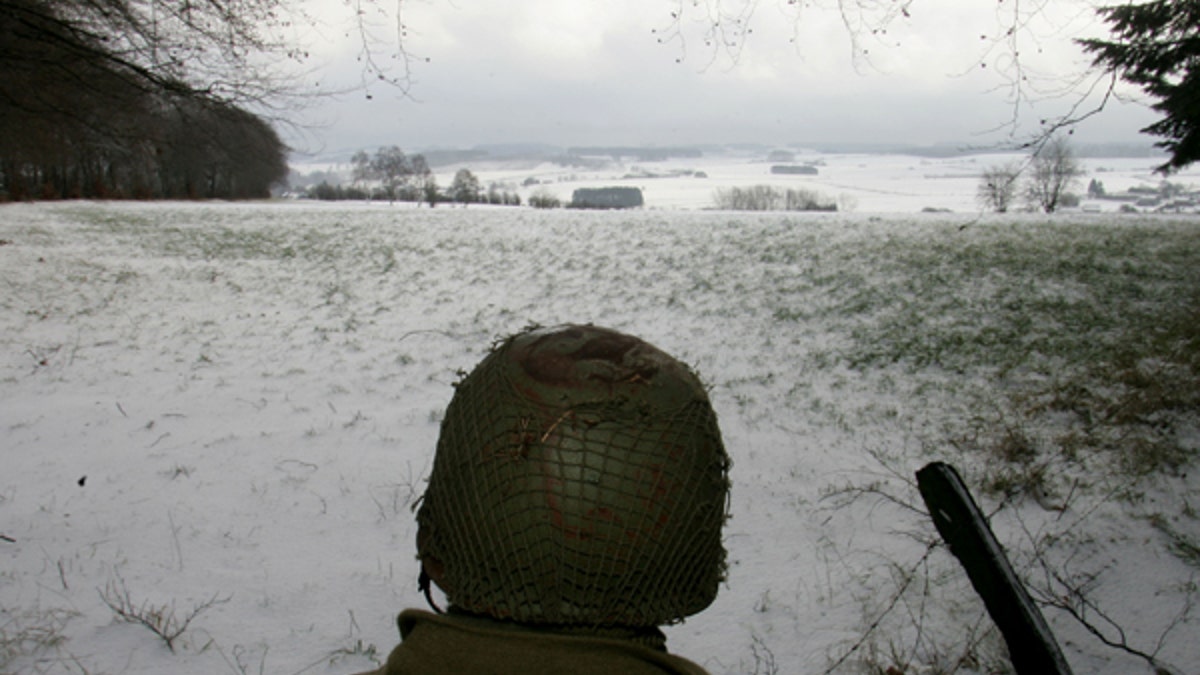
A man dressed as a U.S. soldier looks at the site of the Battle of the Bulge before a ceremony at the Mardasson World War II memorial monument in Bastogne, December 18, 2004. Belgium and Luxembourg commemorate the Battle of the Bulge, a last-ditch German offensive on December 16, 1944 which was the bloodiest land battle of WW2 involving US troops, who suffered some 80,000 casualties, of which 19,000 were killed. REUTERS/Francois Lenoir FLR/SM - RTRILAS (REUTERS/Francois Lenoir)
In January of 1945, J. Herman Sitrick was caught in the midst of a snowstorm in Belgium when he encountered an unarmed German soldier.
Sitrick – a U.S. Army infantryman who was part of the 610,000 troops involved in the decisive Battle of the Bulge – approached the soldier, who begged him in German not to shoot.
"Don't shoot! I have three children,” Sitrick recalled the German soldier saying. Sitrick understood enough German to take pity on his enemy and, instead of shooting him, took his prisoner to a bombed-out farmhouse to wait out the storm.
Sitrick put the German in the basement of the house and then settled down to ride out the bad weather. But as the storm wore on, more German soldiers kept stumbling upon the farmhouse and Sitrick found himself taking in more and more prisoners.
By morning – as tanks from the U.S. 3rd Armored Division rolled by the house – Sitrick had 21 German soldiers held captive in the basement. He turned the nearly two dozen soldiers over to Allied forces before spending a week in a hospital for what he called “frozen feet.”
When he returned to his unit, his comrades told him that reporters and photographers were looking for him, but Sitrick never gave interviews.
More than 72 years later, France awarded Sitrick the Legion d'Honneur on Monday for his heroics in the European theater during World War II. Established by Napoleon Bonaparte in 1802, the Legion d'Honneur is the highest honor bestowed by France for military and civil actions.
What this award means to us more than anything is that his bravery, selflessness and service is not taken for granted at this stage of his life.
France began honoring American World War II veterans who fought on French soil in 2004 as part of the 60th anniversary of the D-Day invasion.
Besides his feat in Belgium, the now 92-year-old Sitrick also fought in Normandy and Brittany in France and in Luxembourg, among other locations in Europe. He eventually left the military in 1946 and went on to found Sitrick Advertising in Skokie, Illinois, where he still works.
Sitrick’s family says despite his heroics in World War II, the former soldier has always remained humble and reserved about his time fighting in Europe, "like most true heroes."
"What this award means to us more than anything is that his bravery, selflessness and service is not taken for granted at this stage of his life," Sitrick’s son Ron told the Chicago Tribune. "The outpouring of love and admiration for our father by so many is astounding and touching for all of us as a family."
The Associated Press contributed to this report.





















